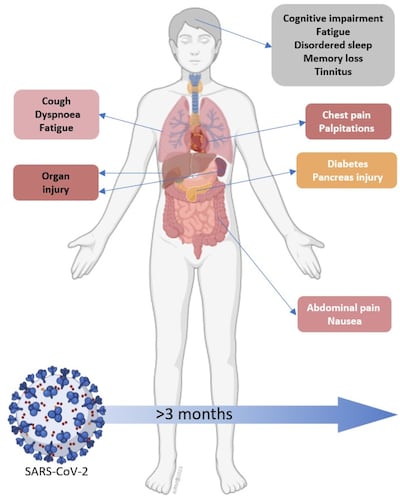While the World Health Organisation has removed Covid-19's health emergency label, it is still a threat, with millions around the world now grappling with long-term health problems after recovering from the virus.
This condition – known as long Covid, post-Covid-19 syndrome or PASC – is also found in other viral diseases such as Zika and Ebola.
About 765 million cases of Covid-19 have been recorded worldwide, though this is believed to be a major undercount.
Long Covid has been observed in those with a history of SARS-CoV-2 infection whose symptoms persist for at least two months, about three months after the onset of Covid-19.
Patients suffering from long Covid often display a variety of symptoms, including fatigue, headache, attention disorder, dyspnea and cognitive dysfunction, which can significantly affect daily functions.
Notably, the occurrence and duration of these symptoms can vary, with neurological and cognitive symptoms tending to appear later and persist longer than respiratory and other symptoms.
The US Centres for Disease Control and Prevention uses the term “Post-Covid Conditions” to describe these symptoms.
The impact of long Covid
New symptoms may appear after the initial recovery, or symptoms from the acute infection may persist, fluctuate or relapse over time.
These ongoing health issues can have a major effect on a person's quality of life and can be associated with functional impairments.
Even seemingly unrelated conditions or diseases, such as autoimmune diseases or diabetes mellitus, can be triggered.
Healthcare professionals have also identified distinct clinical phenotypes related to various underlying disease mechanisms in patients suffering from long Covid.
For instance, a study presented at the 33rd European Congress of Clinical Microbiology and Infectious Diseases organised patients into three distinct phenotypes based on differing characteristics and symptoms.
Long Covid can affect diverse patient populations, including those with comorbidities, pregnant women, the elderly and children.
In February, the WHO released a new definition for paediatric long Covid, paving the way for better characterisation of the disease in paediatric age groups and improving awareness.
Long Covid's prevalence and research needs
Existing research suggests a majority of patients with post Covid-19 condition improve slowly over a two-year course.

Estimates suggest that 43 per cent to 80 per cent of people who catch the virus will experience long Covid.
But more research is needed to understand how people are affected and how symptoms change over time.















